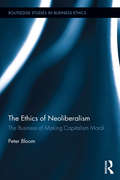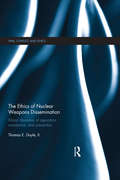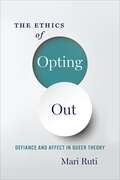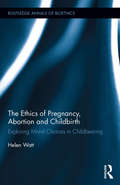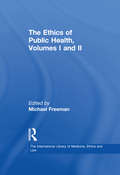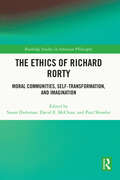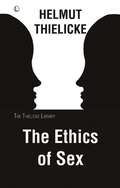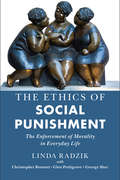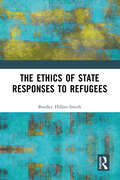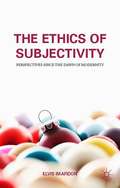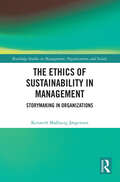- Table View
- List View
The Ethics of Neoliberalism: The Business of Making Capitalism Moral (Routledge Studies in Business Ethics)
by Peter BloomThe 21st century is the age of "neo-liberalism" – a time when the free market is spreading to all areas of economic, political and social life. Yet how is this changing our individual and collective ethics? Is capitalism also becoming our new morality? From the growing popular demand for corporate social responsibility to personal desire for "work-life balance" it would appear that non-market ideals are not only surviving but also thriving. Why then does it seem that capitalism remains as strong as ever? The Ethics of Neoliberalism boldly proposes that neoliberalism strategically co-opts traditional ethics to ideologically and structurally strengthen capitalism. It produces "the ethical capitalist subject" who is personally responsible for making their society, workplace and even their lives "more ethical" in the face of an immoral but seemingly permanent free market. Rather than altering our morality, neoliberalism "individualizes" ethics, making us personally responsible for dealing with and resolving its moral failings. In doing so, individuals end up perpetuating the very market system that they morally oppose and feel powerless to ultimately change. This analysis reveals the complex and paradoxical way capitalism is currently shaping us as "ethical subjects". People are increasingly asked to ethically "save" capitalism both collectively and personally. This can range from the "moral responsibility" to politically accept austerity following the financial crisis to the willingness of employees to sacrifice their time and energy to make their neoliberal organizations more "humane" to the efforts by individuals to contribute to their family and communities despite the pressures of a franetic global business environment. Neoliberalism, thus, uses our ethics against us, relying on our "good nature" and sense of personal responsibility to reduce its human cost in practice. Ironically
The Ethics of Nuclear Weapons Dissemination: Moral Dilemmas of Aspiration, Avoidance and Prevention (War, Conflict and Ethics)
by Thomas E. Doyle, IIThis book examines the moral dilemmas of nuclear dissemination, and the justifications of both nuclear pursuit and avoidance by contemporary states. Applying Constructivist methodologies and moral theory, the author analyses a core set of moral dilemmas that ensnare decision-makers amongst state and non-state nuclear aspirants, as well as amongst states committed to preventing horizontal proliferation. The book shows that the character, structure and implications of these dilemmas have not yet been adequately understood or appreciated, and that such an understanding is necessary for an effective set of nonproliferation policies. Furthermore, it shows that the dilemmas’ force and political policy import are evident in the 'discourses' that diverse actors undertake to defend their nuclear choices, and how the dilemmas of nuclear aspirants are implicated in those of nuclear preventers. The author advocates a number of policy recommendations that reinforce some already made by scholars and experts but, more importantly, others that advise significantly different courses of action. The book reveals how the moral dilemmas of nuclear aspiration, avoidance, and prevention constitute the security dilemmas and paradoxes that comprise much of the 21st century security environment. This book will be of much interest to students of nuclear proliferation, international relations, ethics, and international security studies.
The Ethics of Opting Out: Queer Theory's Defiant Subjects
by Mari RutiIn The Ethics of Opting Out, Mari Ruti provides an accessible yet theoretically rigorous account of the ideological divisions that have animated queer theory during the last decade, paying particular attention to the field's rejection of dominant neoliberal narratives of success, cheerfulness, and self-actualization. More specifically, she focuses on queer negativity in the work of Lee Edelman, Jack Halberstam, and Lynne Huffer, and on the rhetoric of bad feelings found in the work of Sara Ahmed, Lauren Berlant, David Eng, Heather Love, and José Muñoz. Ruti highlights the ways in which queer theory's desire to opt out of normative society rewrites ethical theory and practice in genuinely innovative ways at the same time as she resists turning antinormativity into a new norm. This wide-ranging and thoughtful book maps the parameters of contemporary queer theory in order to rethink the foundational assumptions of the field.
The Ethics of Personalised Medicine: Critical Perspectives
by Verena Sandow Jan Schildmann Jochen VollmannIn recent times, the phrase ’personalised medicine’ has become the symbol of medical progress and a label for better health care in the future. However, a controversial debate has developed around whether these promises of better, more personal and more cost-efficient medicine are realistic. This book brings together leading researchers from across Europe and North America, from both normative and empirical disciplines, who take a more critical view of the often encountered hype associated with personalised medicine. Partially drawing on a four year collaborative research project funded by the German Ministry for Education and Research, the book presents a multidisciplinary debate on the current state of research on the ethical, legal and social implications of personalised medicine. At a time when future health care is a topic of much discussion, this book provides valuable policy recommendations for the way forward. This study will be of interest to researchers from various disciplines including philosophy, bioethics, law and social sciences.
The Ethics of Political Dissent (Routledge Research in Applied Ethics)
by Tony MilliganA broadly liberal politics requires political compassion, not simply in the sense of compassion for the victims of injustice but also for opponents confronted through political protest and (more broadly) dissent. There are times when, out of a sense of compassion, a just cause should not be pressed. There are times when we need to accommodate the dreadfulness of loss for opponents, even when the cause for which they fight is unjust. We may also have to come to terms with the irreversibility of historic injustice and reconcile. Political compassion of this sort carries risks. Pushed too far, it may weaken our commitment to justice through too great a sympathy for those on the other side. It would be convenient if such compassion could be constrained by a clear set of political principles. But principles run the quite different risk of promoting an ‘ossified dissent,’ unable to respond to change. In this book, Tony Milligan argues that principles are only a limited guide to dissent in unique, contingent circumstances. They will not tell us how to deal with the truly difficult cases such as the following: Should the Lakota celebrate Thanksgiving? When is the crossing of a picket line justified? What kind of toleration must animal rights advocates cultivate to make progress within a broadly liberal political domain? And how should we respond to the entangling of aspiration towards social justice with anger and prejudice (such as the ‘anti-Zionist’ discourse)? We may be tempted to answer these questions by presupposing that alignment (the business of choosing sides) is ultimately more important than compassion, but sometimes political compassion trumps alignment. Sometimes, being on the right side is not the most important thing.
The Ethics of Political Dissent (Routledge Research in Applied Ethics)
by Tony MilliganA broadly liberal politics requires political compassion, not simply in the sense of compassion for the victims of injustice but also for opponents confronted through political protest and (more broadly) dissent. There are times when, out of a sense of compassion, a just cause should not be pressed.There are times when we need to accommodate the dreadfulness of loss for opponents, even when the cause for which they fight is unjust. We may also have to come to terms with the irreversibility of historic injustice and reconcile. Political compassion of this sort carries risks. Pushed too far, it may weaken our commitment to justice through too great a sympathy for those on the other side. It would be convenient if such compassion could be constrained by a clear set of political principles. But principles run the quite different risk of promoting an ‘ossified dissent,’ unable to respond to change.In this book, Tony Milligan argues that principles are only a limited guide to dissent in unique, contingent circumstances. They will not tell us how to deal with the truly difficult cases such as the following: Should the Lakota celebrate Thanksgiving? When is the crossing of a picket line justified? What kind of toleration must animal rights advocates cultivate to make progress within a broadly liberal political domain? And how should we respond to the entangling of aspiration towards social justice with anger and prejudice (such as the ‘anti-Zionist’ discourse)? We may be tempted to answer these questions by presupposing that alignment (the business of choosing sides) is ultimately more important than compassion, but sometimes political compassion trumps alignment. Sometimes, being on the right side is not the most important thing.
The Ethics of Pregnancy, Abortion and Childbirth: Exploring Moral Choices in Childbearing (Routledge Annals of Bioethics)
by Helen WattThe Ethics of Pregnancy, Abortion and Childbirth addresses the unique moral questions raised by pregnancy and its intimate bodily nature. From assisted reproduction to abortion and ‘vital conflict’ resolution to more everyday concerns of the pregnant woman, this book argues for pregnancy as a close human relationship with the woman as guardian or custodian. Four approaches to pregnancy are explored: ‘uni-personal’, ‘neighborly’, ‘maternal’ and ‘spousal’. The author challenges not only the view that there is only one moral subject to consider in pregnancy, but also the idea that the location of the fetus lacks all inherent, unique significance. It is argued that the pregnant woman is not a mere ‘neighbor’ or helpful stranger to the fetus but is rather already in a real familial relationship bringing real familial rights and obligations. If the status of the fetus is conclusive for at least some moral questions raised by pregnancy, so too are facts about its bodily relationship with, and presence in, the woman who supports it. This lucid, accessible and original book explores fundamental ethical issues in a rich and often neglected area of philosophy in ways of interest also to those from other disciplines.
The Ethics of Preventive War
by Deen K. ChatterjeeIn this book, eleven leading theorists debate the normative challenges of preventive war through the lens of important public and political issues of war and peace in the twenty-first century. Their discussion covers complex and topical subjects including terrorism, the 'Bush doctrine' and the invasion of Iraq, Iran's nuclear capabilities, superpower unilateralism and international war tribunals. They examine the moral conundrum of preventive intervention and emphasize the need for a stronger and more effective international legal and political order and a corresponding re-evaluation of the normative status of international law. Together their essays form a challenging and timely volume that will be of interest to scholars in ethics and political philosophy, political theory, international relations, international law and peace studies and to general readers interested in the broader issues of peace and justice in the new world order.
The Ethics of Public Health, Volumes I and II (The International Library of Medicine, Ethics and Law)
by Michael FreemanWith a number of public health panics emerging in the past few years, most recently the panic over 'swine flu' in 2009, the publication of this two volume collection is extremely timely. These two volumes cover the complete range of issues relating to the ethics of public health. Topics include the relationship with bioethics, questions of governance, public health and human rights, surveillance and privacy, prevention and its limits, confinement and liberty, as well as detailed case studies of previous and continuing crises relating to HIV and AIDS, SARS, bioterrorism, climate change, avian flu and tobacco control. There are sections also on genetic health, public health and equity, and public health and the developing world. The two volumes include nearly 75 articles by leading thinkers, and are accompanied by Michael Freeman's detailed introduction and full bibliography.
The Ethics of Rapid Tissue Donation: Constructing a Formal and Substantial Informed Consent Process (The International Library of Bioethics #85)
by Chiara MannelliThis book offers a reflection on the central role that the ethics of informed consent plays in Rapid Tissue Donation (RTD). RTD is an advanced oncology procedure that involves the procurement, for research purposes, of “fresh” tissues within two to six hours of a cancer patient’s death. Since RTD involves the retrieval of tissues after death, and since the collected tissues are of great importance for medical research, the need for any form of informed consent to regulate this procedure has been questioned. This book argues for the necessity of informed consent to govern RTD, and it provides the reader with a bespoke informed consent process applicable to cancer patients. The analysis unfolds at the intersection between applied ethics, public health ethics, and clinical ethics, and it is informed by philosophical theories of informed consent and by the social implications of individual choices. By viewing medical issues relating to informed consent in oncology from an ethical perspective, the book combines philosophical analysis with discussion of concrete cancer-related issues. As a result, the book is suitable for readers interested in ethical reasoning as well as for those with a medical background. It contributes to contemporary research by offering an original analysis that relies on a rigorous philosophical approach to address innovative issues at the cutting edge of medical research and policy making.
The Ethics of Research with Human Subjects: Protecting People, Advancing Science, Promoting Trust (The International Library of Bioethics #111)
by David B. ResnikIn The Ethics of Research with Human Subjects, David B. Resnik, PhD/JD, develops and defends an approach to thinking about ethical and policy dilemmas in research with human subjects based on the notion of trust. The book explains why trust is important not only between investigators and research subjects but also between and among other stakeholders involved in the research enterprise, including research staff, sponsors, institutions, communities, oversight committees, government agencies, and the public. Dr. Resnik argues that trust should be viewed as a distinct ethical principle for research with human subjects that complements other principles, such as respect for human dignity, beneficence, non-maleficence, and justice. The book applies the principle of trust to numerous issues, including informed consent, confidentiality/privacy, risk minimization, risk/benefit assessment, payments for participation, protection of vulnerable subjects, experimental design, research integrity, and research oversight. The book also includes discussions of the history of research involving human subjects, moral theories and principles, contemporary cases, and proposed regulatory reforms. This second edition of The Ethics of Research with Human Subjects expands upon and clarifies arguments and ideas discussed in the first edition and includes new material on emerging issues in human research ethics, including community-based research, citizen science research, challenge studies (including COVID-19 experiments), public health research, genomics research, social and behavioral research, xenotransplantation experiments, alternative study designs, and research with people with compromised decisional capacity, employees, and students. The book is of interest to undergraduate and graduate students who are studying ethical and policy issues related to research with human subjects, as well as scientists and scholars who are interested learning more about the issues and thinking about what it means to promote integrity and trust in research with human subjects.
The Ethics of Richard Rorty: Moral Communities, Self-Transformation, and Imagination (Routledge Studies in American Philosophy)
by Susan Dieleman David E. McClean Paul ShowlerThis book contains diverse and critical reflections on Richard Rorty’s contributions to ethics, an aspect of his thought that has been relatively neglected. Together, they demonstrate that Rorty offers a compelling and coherent ethical vision. The book's chapters, grouped thematically, explore Rorty’s emphasis on the importance of moral imagination, social relations, language, and literature as instrumental for ethical self-transformation as well as for strengthening what Rorty called "social hope," which entails constant work toward a more democratic, inclusive, and cosmopolitan society and world. Several contributors address the ethical implications of Rorty’s commitment to a vision of political liberalism without philosophical foundations. Others offer critical examinations of Rorty’s claim that our private or individual projects of self-creation can or should be held apart from our public goals of ameliorating social conditions and reducing cruelty and suffering. Some contributors explore hurdles that impede the practical applications of certain of Rorty's ideas. The Ethics of Richard Rorty will appeal to scholars and advanced students interested in American philosophy and ethics.
The Ethics of Sex (New Dimensions to Religious Ethics)
by Mark D. JordanMark Jordan has written a provocative and stimulating introduction to the issues surrounding sexual ethics and sexuality and theology, filling a much-needed void in this field. Jordan summarizes key topics and themes in the teaching and discussion of religious ethics as well as pushing forward the debate in interesting and original directions.
The Ethics of Sex (Thielicke Library)
by Helmut ThielickeA potentially difficult text for today's Christians, The Ethics of Sex gives a fascinating insight into the mindset of how a Christian thinker considered gender and sexuality when the definitions of both were becoming more and more fluid. Caught between the points of the harsh restrictions of the Third Reich, and the revolutionary approach popularised in the 1960s, Thielicke offers a modern reader the opportunity to understand more of this pivotal period in history. In The Ethics of Sex, Thielicke confronts hot-button issues, many of which are still controversial today, like abortion, homosexuality and artificial insemination. Here he forges a path for the Christian philosopher that is consistent with Christian values of compassion and understanding. While a complex text, The Ethics of Sex rewards both the scholar and the historian.
The Ethics of Sex and Alzheimer's
by John PortmannA growing epidemic, Alzheimer’s punishes not only its victims but also those married to them. This book analyzes how Alzheimer’s is quietly transforming the way we think about love today. Without meaning to become rebels, many people who find themselves "married to Alzheimer’s" deflate the predominant notion of a conventional marriage. By falling in love again before their ill spouse dies, those married to Alzheimer’s come into conflict with central values of Western civilization – personal, sexual, familial, religious, and political. Those who wait sadly for a spouse’s death must sometimes wonder if the show of fidelity is necessary and whom it helps. Most books on Alzheimer’s focus on those who have it, as opposed to those who care for someone with it. This book offers a powerful and searching meditation on the extent to which someone married to Alzheimer’s should be expected to suffer loneliness. The diagnosis of dementia should not amount to a prohibition of sexual activity for both spouses. Portmann encourages readers to risk honesty in assessing the moral dilemma, using high-profile cases such as Nancy Reagan and Justice Sandra Day O'Connor to illustrate the enormity of the problem. Ideal for classes considering the ethics of aging and sexuality.
The Ethics of Sex: A Zondervan Digital Short
by Scott RaeDerived from Scott B. Rae’s widely adopted textbook, Moral Choices, this digital short looks carefully at the Bible’s teaching on sexual ethics and at specific issues like singleness, homosexuality, same-sex marriage, birth control, masturbation, and more. Confronting head-on some of the most difficult topics for Christians to navigate, Rae also includes cases and questions for further discussion. The Ethics of Sex thus provides wise and well-grounded instruction to an ethical question every Christian must answer, namely, “How can I please God in my sexual behavior?”
The Ethics of Social Punishment: The Enforcement of Morality in Everyday Life
by George Sher Christopher Bennett Linda Radzik Glen PettigroveHow do we punish others socially, and should we do so? In her 2018 Descartes Lectures for Tilburg University, Linda Radzik explores the informal methods ordinary people use to enforce moral norms, such as telling people off, boycotting businesses, and publicly shaming wrongdoers on social media. Over three lectures, Radzik develops an account of what social punishment is, why it is sometimes permissible, and when it must be withheld. She argues that the proper aim of social punishment is to put moral pressure on wrongdoers to make amends. Yet the permissibility of applying such pressure turns on the tension between individual desert and social good, as well as the possession of an authority to punish. Responses from Christopher Bennett, George Sher and Glen Pettigrove challenge Radzik's account of social punishment while also offering alternative perspectives on the possible meanings of our responses to wrongdoing. Radzik replies in the closing essay.
The Ethics of Species
by Ronald L. SandlerWe are causing species to go extinct at extraordinary rates, altering existing species in unprecedented ways and creating entirely new species. More than ever before, we require an ethic of species to guide our interactions with them. In this book, Ronald L. Sandler examines the value of species and the ethical significance of species boundaries and discusses what these mean for species preservation in the light of global climate change, species engineering and human enhancement. He argues that species possess several varieties of value, but they are not sacred. It is sometimes permissible to alter species, let them go extinct (even when we are a cause of the extinction) and invent new ones. Philosophically rigorous, accessible and illustrated with examples drawn from contemporary science, this book will be of interest to students of philosophy, bioethics, environmental ethics and conservation biology.
The Ethics of Sports Coaching (Ethics and Sport)
by Alun R. HardmanIs the role of the sports coach simply to improve sporting performance? What are the key ethical issues in sports coaching practice? Despite the increasing sophistication of our understanding of the player-sport-coach relationship, the dominant perspective of the sports coach is still an instrumental one, focused almost exclusively on performance, achievement and competitive success. In this ground-breaking new book, leading sport scholars challenge that view, arguing that the coaching process is an inherently moral one with an inescapably ethical dimension, involving intense relationships between players and coaches. The Ethics of Sports Coaching critically examines this moral aspect, develops a powerful idea of what sports coaching ought to be, and argues strongly that coaches must be aware of the ethical implications of their acts. The book is structured around four central themes: the nature of coaching, the character of the coach, coaching specific populations and specific coaching contexts. It explores in detail many of the key ethical issues in contemporary sports coaching, including: coaching special populations the ethics of talent identification understanding the limits of performance enhancement coaching dangerous sports expatriate coaching setting professional standards in sports coaching. Combining powerful theoretical positions with clear insights into the everyday realities of sports coaching practice, this is an agenda-setting book. It is essential reading for all students, researchers and practitioners with an interest in sports coaching or the ethics and philosophy of sport.
The Ethics of Sports Fandom
by Adam KadlacFans largely regard sports as an escapist pursuit—something that provides distraction from the cares and concerns of "real life." This book pushes back against a fully escapist account of sports fandom and argues that we should understand the value of fandom in terms of the ability of sports to prompt fans to reflect meaningfully on the notion of a good life. Even if we are not engaged in high-level athletics, it is possible to learn a great deal from those who are: what sacrifices are required to achieve our goals; how to persevere through failure and disappointment; and about teamwork and the rewards of accomplishing things together. Moreover, partisan fandom, which has been criticized from various quarters, can teach us valuable lessons about love and what it means to be invested in things over which we have no control. If our reflection on the efforts of individual athletes helps us reflect on our own pursuit of the good life, our attachments to teams can help us to cultivate a certain kind of humility and openness to all that life has to offer. The Ethics of Sports Fandom is an accessible resource for researchers and students interested in the ethics and philosophy of sport that offers an analysis of several different aspects of contemporary fandom: fantasy sports, the ways that fans interact with athletes on social media, violent sports, women’s sports, and the support for our countries’ national teams. In all these areas, reflecting on what it means to respect athletes as individual human beings engaged in their own pursuit of the good life requires that fans consider their sports-related behavior in a new light.
The Ethics of State Responses to Refugees
by Bradley Hillier-SmithThis book appears at a time of intense debate on how states should respond to refugees: some philosophers argue states are not necessarily obligated to admit a single refugee, others argue states should continually admit refugees until the point of societal collapse. Some politicians argue for increasing refugee resettlement, others seek to prevent refugees from arriving at the border. Some countries provide expansive welcome schemes and have taken in over a million refugees, others have erected concrete walls and barbed wire fences.The Ethics of State Responses to Refugees provides an account of what an ethical response would be by developing an understanding of the moral duties that states have towards refugees. The first half of the book analyses state practices used in response to refugees, to understand the negative duties of states not to harm or violate the rights of innocent refugees. The second half analyses morally significant features of contemporary refugee displacement, to understand the positive duties of states to alleviate the distinctive harms and injustices that refugees face. The two halves together thereby outline the negative and positive duties of states towards refugees which together constitute the elements of an ethical response. The book then demonstrates this ethical response is not only urgently required but is also within reach.
The Ethics of Subjectivity
by Elvis ImafidonThe condition into which humans entered since the dawn of modernity altered and led to the disenchantment of traditional (pre-modern) ways of thinking and theorizing in the different spheres of being and discourse mainly due to an emphasis on reason, freedom and the autonomy of the subject. Ethics in particular has continued to experience since modernity a shift from preoccupation with fixated, absolutist systems of ethics such as those built on notions of God and nature to a preoccupationwith the formal, individualistic, fallible or subjective ethical systems that ensue from free and autonomous subjects. The Ethics of Subjectivity presents an examination and analysis of the theorization of this subject-based ethics particularly as presented in the works of key ethicists and philosopher since modernity. These key figures include Kant, Hegel, Bradley, Nietzsche, Foucault, Derrida, Popper, Feyerabend, Habermas, Lacan and Levinas. The volume also examines the implications of the shift to the subject as the focal point of modern ethics for the ever-evolving field of ethics.
The Ethics of Suicide
by Victor CosculluelaOriginally published in 1995, this volume addresses a topical subject: assisted suicide. The book discusses the issues surrounding the morality of suicide and in so doing clarifies the literature in applied ethics. It critiques the complex moral and religious arguments on the topic offered by philosophers and theologians. It establishes a middle position between those who hold that suicide is never morally permissible and those who claim it always is and it determines when second parties ought to aid and when they ought to prevent suicides.
The Ethics of Survival in Contemporary Literature and Culture
by Gerd Bayer Rudolf FreiburgThe Ethics of Survival in Contemporary Literature and Culture delves into the complex problems involved in all attempts to survive. The essays analyze survival in contemporary prose narratives, short stories, poems, dramas, and theoretical texts, but also in films and other modes of cultural practices. Addressing diverse topics such as memory and forgetting in Holocaust narratives, stories of refugees and asylum seekers, and representations of war, the ethical implications involved in survival in texts and media are brought into a transnational critical discussion. The volume will be of potential interest to a wide range of critics working on ethical issues, the body, and the politics of art and literature.
The Ethics of Sustainability in Management: Storymaking in Organizations (Routledge Studies in Management, Organizations and Society)
by Kenneth Mølbjerg JørgensenOrganizational storytelling has been taught for many years in many different places as part of organizational development, organizational change, organizational learning, and business ethics. There has not been any comprehensive framework that addresses sustainability in organizations and so this book develops a new ethics of sustainability for management and organizations. A terrestrial ethics of storymaking is proposed, which responds to Latour’s claim that the Terrestrial has become a new decisive political actor in politics. The Terrestrial is born from Gaia, a metaphor for a new look on life on Earth. Gaia situates life in the thin layer of matter that is the surface of the Earth. It entails the view that nature is a process that humans are part of. Storymaking is constructed from Arendt’s political philosophy, which is rooted ontologically in the principle of natality: rebirth of life. The term ‘storymaking’ is developed from Arendt’s understanding of storytelling as political action to emphasize not only that stories are spatial, embodied and material practices that are tied to a specific time and space but also that technology is an important dimension in making stories. Stories are thus human practices that apart from meaning making and politics involve the use and manipulation of material and objects, and which are crucial for how a human world is shaped. This human world is furthermore shaped by the rhythms of life embedded in the complex landscapes that humans move through. Storymaking is developed through rethinking the links between the central categories of labor, work, action, and thinking in Arendt’s writings. Implications for business ethics are drawn out and a comprehensive ethics framework is constructed that connects the biological and physical with the social, economic, and political regarding how organizations work. Finally, a storymaking philosophy of management is constructed, making this book especially relevant to researchers, academics, managers, and students in the fields of business ethics, management studies, leadership, organizational studies, and international business.
